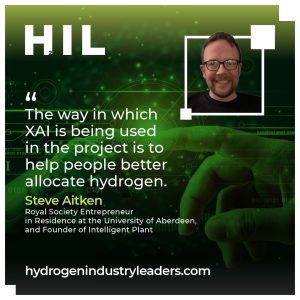AI Project to Amplify Hydrogen Production in Scotland

A new project aims to use artificial intelligence to supercharge hydrogen production in Scotland. Hydrogen Industry Leaders talks to the University of Aberdeen about how the project is helping the country to meet its net zero ambitions.
Computer scientists at the University of Aberdeen and Aberdeen-based software company Intelligent Plant will use explainable AI (XAI) to develop a Decision Support System (DSS) to tackle shortfalls in production and help Scotland meet its target of 5GW of installed hydrogen production by 2030.
They are working in partnership with the European Marine Energy Centre (EMEC) on the project which has been funded through the Scottish Government’s Emerging Energy Technologies Fund.
XAI can help Scotland meet its net zero ambitions

Steve Aitken, Royal Society Entrepreneur in Residence at the University of Aberdeen, and Founder of Intelligent Plant
Hydrogen Industry Leaders spoke to Steve Aitken, Royal Society Entrepreneur in Residence at the University of Aberdeen, and Founder of Intelligent Plant, about how XAI is being used in the project.
He revealed that the technology is being used to provide support: “The way in which XAI is being used in the project is to help people better allocate hydrogen, and that is both how they’re producing it and how they’re transporting it.”
There are complex logical challenges involved in producing green hydrogen and decisions aimed at optimising production are usually made by experts in the field based on experience.
They utilise traditional so-called ‘black-box’ decision support systems that are unable to provide clear reasoning and are not fully trusted by others.
The XAI is working to overcome these shortcomings and the impact on hydrogen production, as it will allow operators to ask the system questions, receive feedback, and modify their approach if necessary.
Steve explained that the XAI is about advising people and having a real effect on the real world: “It is not the person driving the system, it is the system driving the person. That means that where there is no person in the loop, for instance, if we just need to change a setting, we want to be able to get to the point that the system can do that on its own.”
AI technology could help drive the hydrogen economy
There is a rising demand for clean energy sources, and hydrogen could play an essential role in a sustainable energy system. New developments in AI can help to boost technologies such as green hydrogen. AI technologies help provide more accurate models and better solutions.
Expanding on this, Steve expressed how AI technology is key to driving efficiency: “With generating hydrogen, there are pros and cons with everything that you do. We are trying to remove any losses by helping people allocate correctly.”

Recently, AI technology has been a huge topic of conversation, with ChatGPT showing the potential to create new content in a new way. To qualify as AI, a system must exhibit some level of learning and adapting, this means that decision-making systems, automation, and statistics are not defined as AI.
Steve said that genuine AI is not just an equation: “In the case of hydrogen production, we could set up several equations. For example, if the weather changes, how much hydrogen can be generated? The answer would depend on the assumptions that we have had so far.”
The advantage of using XAI in hydrogen projects means that we can be dynamic to a changing system, and we are able to take into account things that we didn’t anticipate at the offset.
The decisions that the AI system makes are a guide
As the world is constantly evolving and changing, AI systems need to be constantly retrained using new data. Without doing so, the systems will give answers that are incorrect or don’t take new information into account.
Due to this constant retraining, Steve highlighted that though one of the main fears people have about AI is the risk to jobs, people will always be needed to support this technology: “AI is going to have an effect on the entire population. That was made apparent after we applied for the project. We had applied before anyone was aware of how far language models as a particular part of AI had gone and how good it was.
“Now that people are seeing this, they are worried. They are worried it will change how we work. However, these systems don’t replace people, but they do change them. People are still needed.”
Another fear people have of AI technology is that the system will make the wrong decision, Steve explained that as people are still needed, the decisions that the system makes are just a guide.
He said: “This project at the outset is not going to be controlling the hydrogen production. Instead, it is going to be explaining that we should do X and allow the human to decide if that is right or wrong, and to see the outcome afterwards.”
It is about bringing people along as part of the journey and seeing people build trust in the system.
The project will work to enable users to interrogate the system and understand why it suggested specific courses of action. By taking this approach, it will help to build this trust amongst users which will help to boost in the production of green hydrogen.
In the longer term, it is hoped that the technology will benefit other renewable sources such as wind and solar, further increasing the project’s impact.

